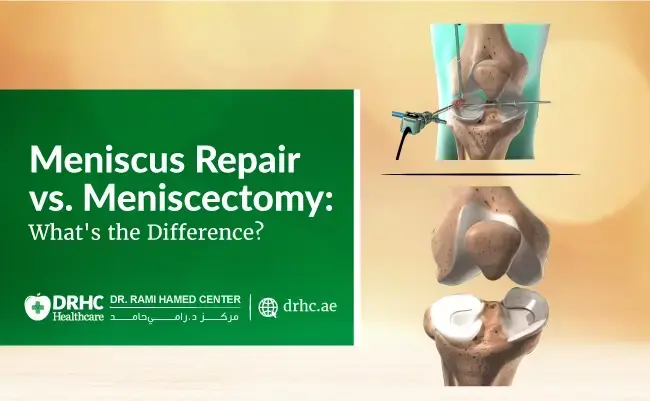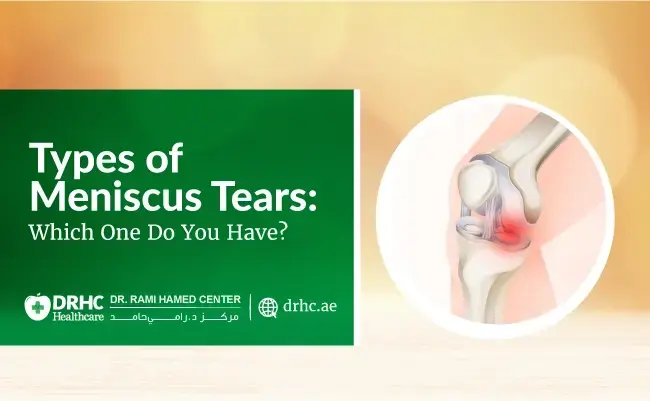
A meniscus tear is one of the most common knee injuries, often caused by sports, sudden twists, or simply wear and tear over time. If you've recently been diagnosed with this condition, you may be wondering—do I need surgery, or can it heal on its own?
This is a very common and valid concern. The idea of surgery can feel overwhelming, especially when you’re unsure what’s best for your long-term recovery. At Dr. Rami Hamed Center (DRHC) in Dubai, we’re here to guide you through your options with clarity, empathy, and medical expertise.
What Is a Meniscus Tear?
The meniscus is a C-shaped piece of cartilage in your knee that cushions and stabilizes the joint. Each knee has two menisci—one on the inner side (medial) and one on the outer side (lateral). Tears can happen suddenly (due to trauma) or gradually over time due to degeneration.
Symptoms of a meniscus tear may include:
- Pain along the knee joint
- Swelling or stiffness
- Clicking or locking sensation
- Difficulty bending or straightening the knee
Once a tear is confirmed—usually through a physical exam and MRI—the next step is determining the best treatment.
Can a Meniscus Tear Heal Without Surgery?
The short answer is: sometimes, yes. But it depends on several important factors.
1. Type and Location of the Tear
The meniscus has two zones:
- Red zone: Outer edge, where there is a good blood supply.
- White zone: Inner part, with little to no blood flow.
Tears in the red zone have a better chance of healing naturally because blood flow is essential for tissue repair. In contrast, tears in the white zone typically do not heal on their own and may require surgical intervention.
2. Severity of the Tear
Small, stable tears—especially those that don’t interfere with joint movement—may improve over time with conservative treatment. Larger or displaced tears that cause locking, instability, or chronic pain are less likely to heal without surgery.
3. Your Age and Activity Level
Younger individuals with healthy tissue and an active lifestyle may respond better to non-surgical treatments. On the other hand, degenerative tears in older adults may require different strategies depending on mobility and joint health.
Non-Surgical Treatment Options
At DRHC Dubai, we explore all non-invasive approaches before recommending surgery—especially if the tear is stable and symptoms are manageable. These may include:
- Rest and activity modification: Avoid movements that worsen the pain, especially deep knee bending or twisting.
- Ice and elevation: Helps reduce swelling and discomfort.
- Physical therapy: A customized exercise program to strengthen surrounding muscles, improve flexibility, and support the joint.
- Medications: Anti-inflammatory drugs (NSAIDs) to reduce pain and swelling.
- Knee braces: May help stabilize the joint and limit painful motion during healing.
With patience and proper care, many people find significant relief using these methods—sometimes avoiding surgery altogether.
When Is Surgery the Better Option?
While conservative treatment can be very effective for certain cases, surgery might be the safest and most reliable choice when:
- The tear is large or located in the white zone
- The knee locks or gives way
- Pain persists despite several weeks of non-surgical treatment
- You need to return to a physically demanding job or sport
There are two main surgical procedures:
- Meniscus repair (stitching the tear together)
- Meniscectomy (removing the torn portion)
Both are minimally invasive and performed using arthroscopy, meaning smaller incisions, less pain, and quicker recovery.
Our Related Blogs:
- Painful Kneecap? Patellar Misalignment Can Be Treated with Arthroscopy
- Chronic Knee Pain Despite Rest? Arthroscopy Can Diagnose & Treat the issue
- Stiff Knee After Injury? Scar Tissue Might Require Arthroscopic Cleanup
- Can't Squat Without Pain? Meniscus Tears Often Respond Well to Arthroscopy
- What Is a Meniscus Tear? Causes, Symptoms, and Treatment Options
- Types of Meniscus Tears: Which One Do You Have?
- Meniscus Repair vs. Meniscectomy: What's the Difference?
Common Concerns About Meniscus Treatment
Will I be able to walk without surgery?
Yes, many people with small tears can walk and perform daily activities comfortably after a period of rest and rehab. However, ignoring symptoms for too long may worsen the damage over time.
How long does it take to heal without surgery?
Recovery without surgery can take 6 to 8 weeks or more, depending on the tear and your activity level. Sticking to a structured physical therapy plan is essential.
Is there a risk of arthritis if I skip surgery?
A poorly healed or unstable meniscus tear can increase stress on the joint, raising the risk of arthritis later on. Regular monitoring and follow-up at DRHC Dubai can help prevent long-term complications.
Every Knee Is Unique—So Is Your Treatment Plan
There’s no one-size-fits-all answer when it comes to treating a meniscus tear. The good news is that many tears can heal without surgery, especially when they are small and located in the right part of the meniscus. The key is a thorough evaluation and a personalized plan that suits your needs, lifestyle, and long-term health.
At Dr. Rami Hamed Center in Dubai, our orthopedic specialists are here to provide clear guidance, compassionate care, and the most advanced treatment options available- whether surgical or not
Choosing the Right Option for You
Your age, activity level, type and location of the tear, and long-term goals all play a role in deciding between meniscus repair and meniscectomy. At DRHC Dubai, our orthopedic specialists take the time to assess your unique situation and guide you toward the most effective and safest solution.
At Dr. Rami Hamed Center in Dubai, our orthopedic specialists are here to provide clear guidance, compassionate care, and the most advanced treatment options available—whether surgical or not.
Need help with a meniscus tear?
Book a consultation at DRHC Dubai and take the first step toward a pain-free future. Our expert team will help you make the right decision, with your comfort and recovery as our top priorities.
Call +97142798200 us now to schedule your consultation today!
Visit our Spine Center at DRHC Dubai – Located in Dubai Healthcare City





.jpg)



Leave a comment